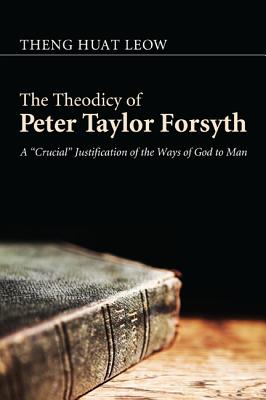The theodicy of the remarkable Scottish Congregationalist theologian Peter Taylor Forsyth has long been recognized as a vital and significant contribution to twentieth-century theology. Up until now, however, there has not been a substantial full-length treatment of Forsyth’s work on the problem of evil. The Theodicy of Peter Taylor Forsyth fills this lacuna by setting out, in a fairly systematic and comprehensive manner, Forsyth’s justification of God in the face of evil. In so doing, it also illuminates several other related areas of his thought, such as his epistemology and Christology, as well as his understanding of sin, the atonement, providence, divine passibility, human origins, and the God-world relationship. Bringing Forsyth’s approach to the subject into conversation with other prominent thinkers like Leibniz, Dostoyevsky, Camus, Moltmann, Hick, Bauckham, and Fiddes, this book also suggests ways in which Forsyth’s justification of God contributes to the current state of Christian theodicy. It highlights Forsyth’s ability to integrate insights from different approaches, even those that have hitherto generally been considered diametrically opposed notions. Forsyth’s theodicy therefore presents an integrative approach to the topic, with every theme flowing from and returning to a clear center: the cross of Christ. As the book also makes clear, Forsyth considers theodicy to be an immensely practical discipline, with significant implications for human life. In every sense, therefore, it constitutes a ""crucial"" justification of the ways of God to humanity.
| FindBook |
有 1 項符合
The Theodicy of Peter Taylor Forsyth: A "Crucial" Justification of the Ways of God to Man的圖書 |
 |
The Theodicy of Peter Taylor Forsyth: A "Crucial" Justification of the Ways of God to Man 作者:Leow 出版社:Pickwick Publications 出版日期:2011-11-08 語言:英文 規格:平裝 / 288頁 / 22.6 x 15 x 1.5 cm / 普通級 |
| 圖書館借閱 |
| 國家圖書館 | 全國圖書書目資訊網 | 國立公共資訊圖書館 | 電子書服務平台 | MetaCat 跨館整合查詢 |
| 臺北市立圖書館 | 新北市立圖書館 | 基隆市公共圖書館 | 桃園市立圖書館 | 新竹縣公共圖書館 |
| 苗栗縣立圖書館 | 臺中市立圖書館 | 彰化縣公共圖書館 | 南投縣文化局 | 雲林縣公共圖書館 |
| 嘉義縣圖書館 | 臺南市立圖書館 | 高雄市立圖書館 | 屏東縣公共圖書館 | 宜蘭縣公共圖書館 |
| 花蓮縣文化局 | 臺東縣文化處 |
|
|
圖書介紹 - 資料來源:博客來 評分:
圖書名稱:The Theodicy of Peter Taylor Forsyth: A "Crucial" Justification of the Ways of God to Man
|









